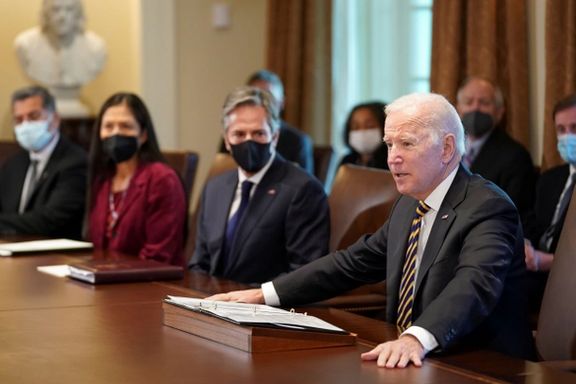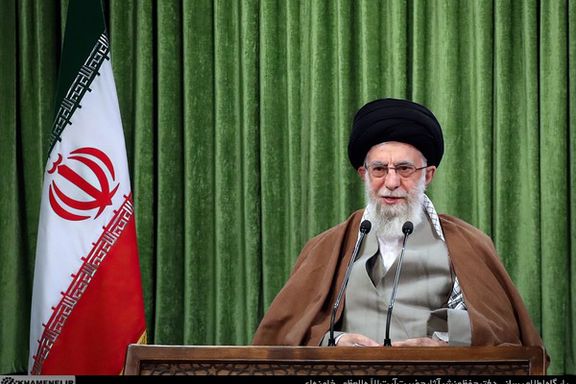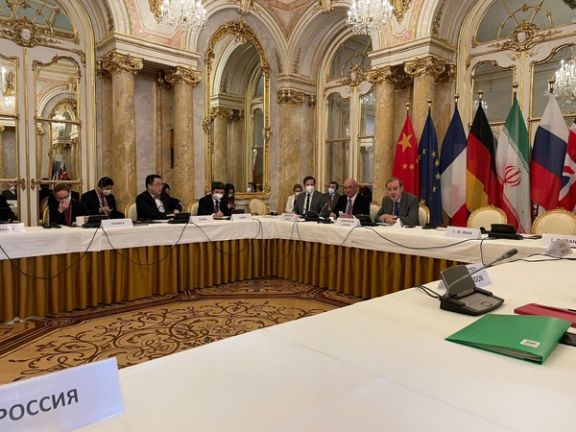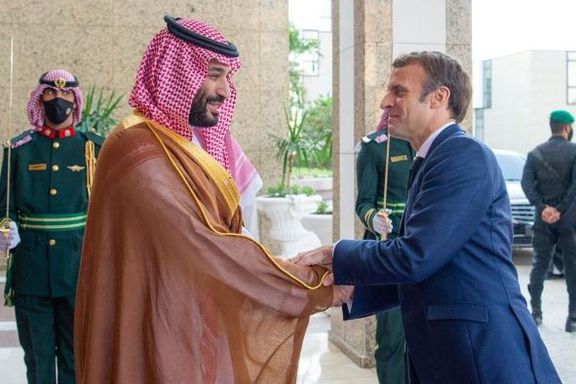Israel's Bennett Urges World Powers To Be Tough With Iran

Israeli Prime Minister Naftali Bennett on Sunday urged world powers to take a hard line against Iran in nuclear talks held in Vienna earlier in the week.

Israeli Prime Minister Naftali Bennett on Sunday urged world powers to take a hard line against Iran in nuclear talks held in Vienna earlier in the week.
Bennet is dispatching his top defense and intelligence officials to Washington to discuss the flailing talks.
“I call on every country negotiating with Iran in Vienna to take a strong line and make it clear to Iran that they cannot enrich uranium and negotiate at the same time,” Bennett told a meeting of his Cabinet.
“Iran must begin to pay a price for its violations.”
Buoyed by the failure of negotiators to make any breakthrough in the Vienna talks, chief of Israel’s Mossad and its defense minister visit Washington this week to urge the Biden Administration not to make concessions to Iran.
Prominent voices in Israel are now indicating the US withdrawal, especially without a contingency plan for Iran's continuously developing nuclear plan, was a blunder.
But Israel’s new government has maintained a similar position as former Prime Minister Benjamin Netanyahu, rejecting a return to the original deal and calling for diplomacy to be accompanied by military pressure on Iran.

With the disappointing end to the Iran nuclear talks on Friday, Israel is engaged in new efforts to dissuade Washington from offering any concessions to Tehran.
Israeli Prime Minister Naftali Bennett urged world powers to take a hard line against Iran in negotiations aimed at reviving 2015 nuclear agreement, as his top defense and intelligence officials headed to Washington to discuss the flailing talks.
Israeli officials believe that the US did not expect Iran to come to Vienna with an uncompromising posture and they think the pause in the talks offers a chance for them to put pressure on the Biden Administration to reconsider its approach toward Iran, Haaretz reported.
Haaretz reported that Israeli officials repeated a warning over the weekend that the United States might still be interested in offering sanctions relief to Tehran in exchange for a partial deal.
Mossad chief David Barnea travels to Washington on Sunday to discuss the Iran nuclear negotiations, after the three European signatories of the Iran nuclear deal (JCPOA) and the US voiced disappointment at the seventh round of talks with Iran in Vienna.
Israel opposed the original deal, arguing that it would not stop Iran to produce nuclear weapons as its limitation are due to mostly end by 2030. Israel also backed former president Donald Trump’s decision to withdraw from the JCPOA in 2018 and pursue ‘maximum pressure’ sanctions.
With the Biden Administration seemingly eager to restore the agreement, Israel and others believe the outcome would be even worse than the previous deal, without expanding its limitation.
Iran’s new hardline government appears not to be in the mood for any concessions, reneging even on compromises it had made in the first six round of talks from April to June.
Haaretz said that Barnea will try to persuade the Biden Administration to avoid an interim or partial deal if it does not ensure Iran’s return to full compliance with the JCPOA limitations. The most important cap the agreement put on Iran’s nuclear program was its limit on uranium enrichment.
Iran began breaking those limits in 2019 as retaliation against US sanctions and accelerated enrichment even further in early 2021 just as the new US administration announced its readiness to engage in talks to revive the agreement.
On Sunday when the Israeli deputy defense minister Alon Schuster was asked about a loud explosion Saturday night near Iran’s key nuclear site, he said “can’t say” what hit Natanz. He added that Israel is currently trying to bring about a change in the motivations of the whole world through diplomatic means.”
“We have a duty to be brave and responsible for the fate of our children and grandchildren,” he said. “We have used force against our enemies in the past and we are convinced that in extreme situations, there is a need to act using military means.”
Haaretz also said that Barnea’s meetings in Washington will be “extremely significant”. He will tell the Americans that Israel will not consider itself bound by any agreement with Iran. Earlier, Israeli officials had said that if a deal does not permanently block Iran’s path to nuclear weapons, it has to act based on its national security requirements.
Israeli defense minister Benny Gantz will also visit Washington later in the week, with talks expected to focus on Iran.

Iran abandoned any compromises it had made in previous nuclear talks, pocketed those made by others, and demanded more this week, a senior US official has said.
Reuters reported Saturday that according to an unnamed US official speaking to reporters, Tehran's stance during the first such talks in more than five months disappointed not just the United States and its European allies but also China and Russia, historically supportive of Iran.
While stressing that the United States still wanted to revive the Joint Comprehensive Plan of Action (JCPO), the official told reporters time was running short.
The indirect US-Iranian talks on saving the deal broke off on Friday in Vienna as European officials also voiced dismay at sweeping demands by Iran's hardline government.
The latest talks were the first with delegates sent by Iran's anti-Western President Ebrahim Raisi, who was elected in June and whose government had said it needed time to prepare for fresh talks after the six rounds between April and June. But Iran delayed its return to the talks and ramped up its uranium enrichment, expanding its stockpile to more than 200 kg of fissile material purified to 20 and 60 percent. This has cut the breakout time for Tehran to weeks instead of months.
The senior US official said Iran used the time to speed up its nuclear program in "provocative" ways and to stonewall the UN nuclear watchdog charged with monitoring its eroding compliance with the deal.
While seeking to leave the door ajar for talks, the official blamed Iran as "the reason why there is not ... a mutual return to compliance" with the original deal.
Tehran, however, has placed the onus on Washington, noting that then-President Donald Trump withdrew the United States from the deal in 2018 and reimposed sanctions, prompting Iran to begin violating the nuclear restrictions starting in 2019.
The 2015 agreement imposed strict limits on Iran's uranium enrichment activities, extending the time it would need to produce enough fissile material for a nuclear weapon, if it chose to, to at least a year from around two to three months.
While saying it was unclear whether China and Russia might ramp up economic pressure on Iran if talks fail, he suggested their positions may be evolving.
"They also were quite taken aback by the degree to which Iran had walked back its own compromises and then doubled down on the requests that it (made)," he said. "They do share a sense of disappointment, to put it diplomatically."
The US official said he did not know when the next round of talks would resume - others had said next week - and said the date was less important than Iran's willingness to negotiate.
American officials have said they would consider other options if they cannot revive the deal, a phrase understood to include the possibility of military ones, however remote.
Reporting by Reuters

In the wake of unsuccessful nuclear negotiations in Vienna, some state media in Iran on Saturday tried to put a more positive spin saying talks will continue.
Western media including British newspaper Guardianhave covered the end of the seventh round of nuclear negotiations saying that the talks "were suspended on Friday, with Europe warning that Iran had walked back on all previous diplomatic progress and fast-forwarded its nuclear programme." But some Iranian media including the IRGC-linked newspaper Javan have described the event as "European and US partners of the JCPOA taking Iran's proposals home with them for consultations in their capitals."
At the same time, other media such as proreform website Fararu have opined that "The nuclear talks are not about Iran's nuclear program. They are about a new, emerging world order as the United States' power is declining." Fararu furthermore quoted British journalist Peter Oborne as saying that the nuclear talks mark the beginning of a new Cold War in which instead of the United States and the Soviet Union, now China and the US are facing each other. Fararu quoted him as saying that this new Cold War started as the US hurriedly withdrew from Afghanistan and turned its focus to Asia.
The administration-owned daily newspaper Iran ran an optimistic front-page headline: "Laying the foundations for lifting the sanctions."
But Kar-o-Kargar daily, close to former Rouhani spokesman Ali Rabiei, ran an utterly pessimistic front-page headline: "The shadow of despair on the negotiating table." While Iran believes that the talks are going to be resumed next week, Kar-o-Kargar said that the talks have come to end for good.
Economic daily Asia took a position in between the two and quoted reformist lawmaker Massouid Pezeshkian as saying that negotiations would be meaningless without "give and take" and suggested that if Iran is looking for a solution to its economic problems, its nuclear negotiators should return to the talks next week.
Foreign policy analyst Ali Bigdeli told Setareh Sobh daily that Iran should withdraw its excessive demands and stick to a minimal request for lifting some of the sanctions.
Another economic daily, Jahan-e Sanat discussed the negotiations with several Iranian experts in a series of debates that were primarily focused on the role of China in the nuclear talks. Observers generally said that China appeared to be silent during this round of the negotiations. Experts told Jahan-e Sanat that the suspension of the talks is in China's interest and that China favors a situation where Iran and the West do not reach an agreement.
Jalal Sadatian, a former Iranian diplomat, told the daily that China is worried about any improvement in Iran's ties with the West. He added that both China and Russia benefit from the sanctions on Iran. Particularly China benefits from being the sole customer for Iran's oil.
Another former diplomat, Fereidoun Majlesi, agreed with Sadatian and said that "thanks to the sanctions, China has now monopolized trade with Iran and is using the situation to sell everything at a higher price while buying Iran's oil at unbelievable discounts."
Asked why Iran counts on China and Russia as its supporters in the nuclear negotiations, Majlesi said: "Iran feels committed to enmity with the United States and this brings it close to China from an ideological standpoint." He further said that Iran is isolated in the international community but likes to say that there are countries such as China that are Iran's allies.
Mohammad Marandi, a member of the Iranian negotiating team as well as some Iranian officials in Tehran said on Friday that that Iran will turn to China if the United States refuses to return to the JCPOA.
Ironically, Iranian journalist and historian Hossein Dehbashi revealed on Twitter on Saturday that Marandi is a US citizen and questioned his support for Iran in the negotiations. Marandi in his response posted a picture on Twitter and claimed the photo shows him in Basij militia uniform when he was 16.

French President Emmanuel Macron has reiterated that regional states should be involved in talks with Iran to improve the chances of a nuclear agreement.
Speaking to reporters Saturday, Macron said it is important “to reengage a slightly broader dynamic and involve regional powers as well,” an added. “It is difficult to reach an agreement if the Gulf states, Israel and all those whose security is directly affected are not involved.”
It was significant that Macron mentioned Israel, that Iran has repeatedly threatened to destroy. Israel has also vowed never to allow Iran to acquire nuclear weapons.
The French president had said in January that Saudi Arabia and other regional powers should be part of talks to restore the 2015 Iran nuclear deal, JCPOA.
The United States and its three European allies, the United Kingdom, France and Germany that are negotiating with Iran in Vienna also want to address Tehran’s regional policy of supporting militant, proxy groups, but Tehran has flatly rejected any talks beyond the revival of the JCPOA.
Talks with Iran that resumed on November 29 adjourned on Friday without a success amid pessimism among Western countries who said that Tehran did not show any sign of being ready to reach a deal.

Nuclear talks over Iran's nuclear deal broke off until next week as European officials voiced dismay Friday at sweeping demands by Iran's hardline government.
Iran suspended talks in June after President Ebrahim Raisi’s election saying it needed time to form a new government, but it kept delaying its return, heightening suspicions among US and European officials that Iran is playing for time while advancing its nuclear program.
"Iran right now does not seem to be serious about doing what's necessary to return to compliance, which is why we ended this round of talks in Vienna," US Secretary of State Antony Blinken told the Reuters Next Conference.
"If the path to a return to compliance with the agreement turns out to be a dead-end, we will pursue other options," he added, without elaborating.
But the US has been making this threat for weeks, saying that it will wait for the new round of talks in Vienna to see if Tehran is serious.
Diplomats said the Iranian delegation had proposed sweeping changes to a text that was painstakingly negotiated in previous rounds and that European officials had said was 70-80% finished.
'DISAPPOINTMENT AND CONCERN'
"Over five months ago, Iran interrupted negotiations. Since then, Iran has fast-forwarded its nuclear program. This week, it has back-tracked on diplomatic progress made," senior officials from France, Britain and Germany said in a statement, adding that Iran was demanding "major changes" to the text.
It is "unclear how these new gaps can be closed in a realistic time frame", they added.
The three European powers expressed "disappointment and concern" at Iran's demands, some of which they said were incompatible with the deal's terms or went beyond them.
The 2015 agreement imposed strict limits on Iran's uranium enrichment activities, extending the time it would need to produce enough fissile material for a nuclear bomb, if it chose to, to at least a year from around two to three months. Most experts say that period is now shorter than before the deal.
Iran denies seeking nuclear weapons, saying it only wants to master nuclear technology for peaceful purposes.
After more than two years of Iranian adherence to the core curbs, however, then-President Donald Trump pulled the United States out of the deal in 2018, calling it too soft on Tehran, and reimposed painful US economic sanctions on Tehran.
Tehran retaliated from 2019 by breaching many of the deal's limits on enrichment and other restrictions, advancing well beyond them. With the deal's nuclear benefits now badly eroded, some Western officials say there is little time left before the foundation of the deal is damaged beyond repair.
French President Emmanuel Macron said he thought it likely the current round of talks would not succeed and appeared to look beyond them, hinting at involving more nations, such as Gulf Arab states, in a wider discussion if the Vienna talks fail.
"I think it's very difficult to find an agreement if the Gulf countries, Israel, all those whose security is directly affected, don't take part," he told reporters in Dubai. Macron had expressed the same stance last year.
FIRM STANCE
Iranian nuclear negotiator Ali Bagheri Kani's uncompromising stance is that since Washington left the deal, it should make the first move by lifting all sanctions imposed on Tehran since then, even those unrelated to Tehran's nuclear activities.
However, he left the door ajar for more talks by saying European nations could propose their own drafts for discussion, Iranian state media reported.
However, more talks would mean the talks stretching into 2022 as the holiday season approaches and more time for Iran to add to its stockpile of highly enriched uranium.
With reporting by Reuters